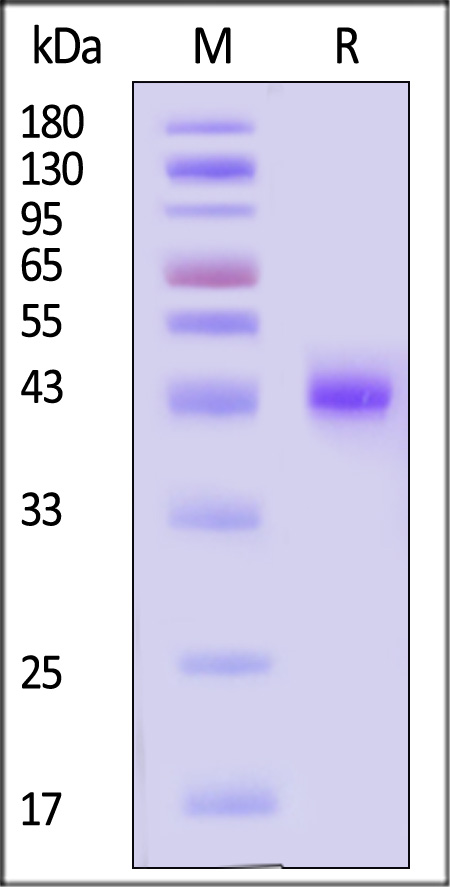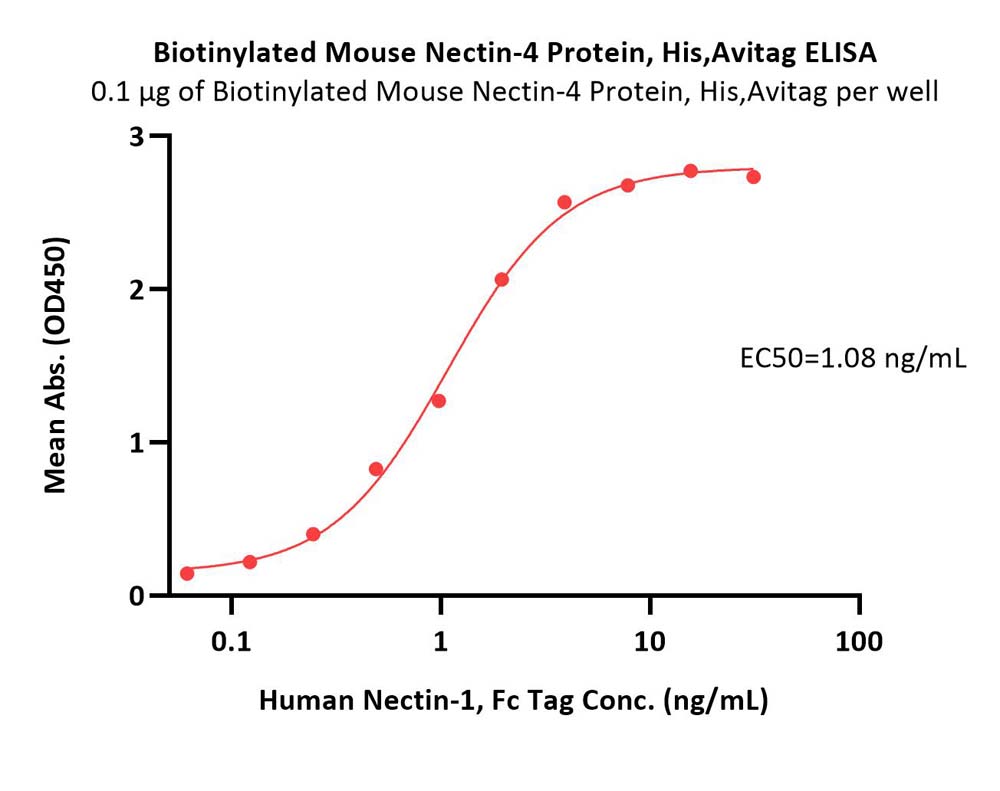分子别名(Synonym)
NECTIN4,LNIR, PRR4, PVRL4
表达区间及表达系统(Source)
Biotinylated Mouse Nectin-4 Protein, His,Avitag (NE4-M82E7) is expressed from human 293 cells (HEK293). It contains AA Gly 31 - Ser 347 (Accession # Q8R007-1).
Predicted N-terminus: Gly 31
Request for sequence
蛋白结构(Molecular Characterization)

This protein carries a polyhistidine tag at the C-terminus, followed by an Avi tag (Avitag™)
The protein has a calculated MW of 37.9 kDa. The protein migrates as 43-48 kDa when calibrated against Star Ribbon Pre-stained Protein Marker under reducing (R) condition (SDS-PAGE) due to glycosylation.
标记(Labeling)
Biotinylation of this product is performed using Avitag™ technology. Briefly, the single lysine residue in the Avitag is enzymatically labeled with biotin.
蛋白标记度(Protein Ratio)
Passed as determined by the HABA assay / binding ELISA.
内毒素(Endotoxin)
Less than 1.0 EU per μg by the LAL method.
纯度(Purity)
>90% as determined by SDS-PAGE.
>90% as determined by SEC-MALS.
制剂(Formulation)
Lyophilized from 0.22 μm filtered solution in PBS, pH7.4 with trehalose as protectant.
Contact us for customized product form or formulation.
重构方法(Reconstitution)
Please see Certificate of Analysis for specific instructions.
For best performance, we strongly recommend you to follow the reconstitution protocol provided in the CoA.
存储(Storage)
For long term storage, the product should be stored at lyophilized state at -20°C or lower.
Please avoid repeated freeze-thaw cycles.
This product is stable after storage at:
- -20°C to -70°C for 12 months in lyophilized state;
- -70°C for 3 months under sterile conditions after reconstitution.
质量管理控制体系(QMS)
电泳(SDS-PAGE)

Biotinylated Mouse Nectin-4 Protein, His,Avitag on SDS-PAGE under reducing (R) condition. The gel was stained with Coomassie Blue. The purity of the protein is greater than 90% (With Star Ribbon Pre-stained Protein Marker).
SEC-MALS

The purity of Biotinylated Mouse Nectin-4 Protein, His,Avitag (Cat. No. NE4-M82E7) is more than 90% and the molecular weight of this protein is around 35-50 kDa verified by SEC-MALS.
Report
活性(Bioactivity)-ELISA

Immobilized Biotinylated Mouse Nectin-4 Protein, His,Avitag (Cat. No. NE4-M82E7) at 1 μg/mL (100 μL/well) on streptavidin (Cat. No. STN-N5116) precoated (0.5 μg/well) plate can bind Human Nectin-1, Fc Tag (Cat. No. PV1-H5253) with a linear range of 0.1-2 ng/mL (QC tested).
Protocol
背景(Background)
Nectin-4(Nectin cell adhesion molecule 4) is a Nectin and nectin-like family of cell adhesion molecules. It is found in high levels in normal embryonic and fetal tissues, but decreases after adulthood and is limited in distribution in healthy tissues. Nectin-4 is overexpressed in a variety of tumor cells and promotes tumor cell growth and proliferation. Solid tumors with high expression of Nectin-4 include bladder cancer, pancreatic cancer, triple negative breast cancer, non-small cell lung cancer, stomach cancer, esophageal cancer, ovarian cancer and many other cancers. Studies have found that Nectin-4 promotes tumor cell proliferation, differentiation, migration and invasion by activating the PI3K/Akt pathway, and is believed to play an important role in the occurrence and metastasis of cancer. It is based on these research backgrounds that drug research targeting this target has emerged.























































 膜杰作
膜杰作 Star Staining
Star Staining















